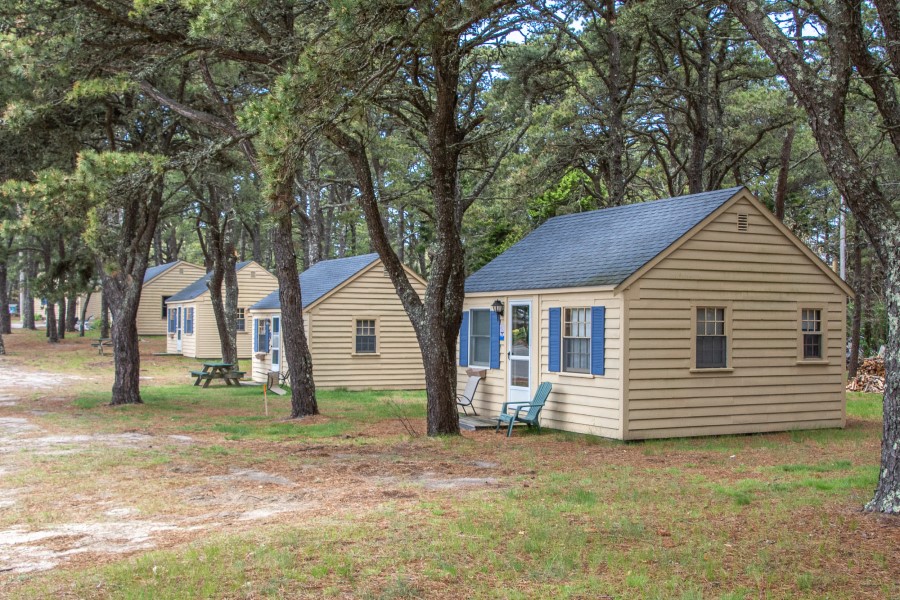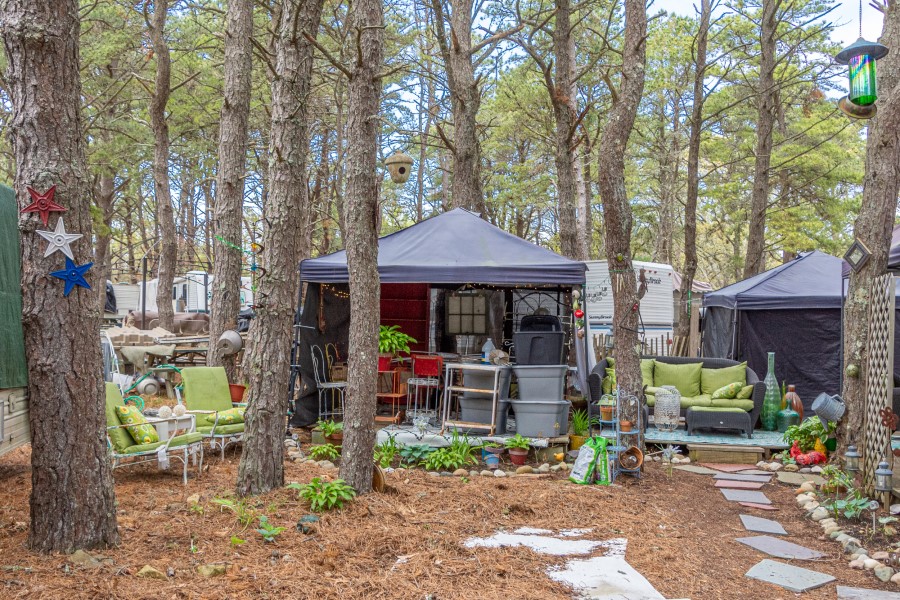WELLFLEET — Voters will be asked to buy a 21-acre campground with 240 campsites for $6.5 million at the Sept. 10 special town meeting. The goal is to create a place to build workforce and year-round housing. But the board of health must first approve a waiver needed to allow the purchase to go through without immediately upgrading the 35 grandfathered cesspools on the property.

“This is a tough call,” board of health member Nick Picariello told the proponents of the purchase, who include the select board, town administrator, Maurice’s Campground Working Group, and affordable housing trust members. Those proponents made their first request for the waiver on Aug. 24 — just 17 days before town meeting. The health board will not take a vote until its next meeting on Sept. 7.
Board of health member Janet Drohan called the timing “disrespectful,” adding that “this is not even allowing time for a civilized conversation.
“We’re totally excited about the purchase of Maurice’s Campground,” Drohan continued. “My vote at town meeting would absolutely be to buy this property, and that won’t change. But I have to be able to put my head down on my pillow knowing my mission as a member of the board of health, which is to safeguard the water in Wellfleet.”
The proponents are asking for a waiver for six years because the current owners, three Gauthier brothers whose parents bought the place in 1949, stipulated in the agreement they made in April with the town for the business to continue to operate as a seasonal campground to protect their tenants. John Gauthier, the youngest of the brothers, said the benefit of selling to the town is that protection, something that a private developer would never agree to.
Those tenants turn out to be a significant number of the Outer Cape’s seasonal workforce. They include 50 to 60 seasonal workers employed at Mac’s Seafood restaurants and fish markets, other restaurants including the Pearl, the Bookstore, Joey’s Taco Joint, Montano’s, the Surf Club, and CShore Kitchen & Bar, and other businesses from Provincetown to Eastham, John Gauthier told the Independent on Aug. 29.
Right now, 10 businesses own trailers on the property where they house workers, and Gauthier leases out another 20 to 25 trailers to other businesses. The cost to rent a campsite is $5,000 for the season, said Kathleen Nagle, a member of the housing trust.
An Opportunity, With Challenges
Town Administrator Rich Waldo agreed that the timing is not ideal. But, he told the health board on Aug. 24, Outer Cape towns don’t have the luxury of time. This kind of land is rarely available unless “it falls in our lap,” he said. “We are trying to seize the opportunity.”

The state Dept. of Environmental Protection (DEP) does grant variances for special circumstances, “and we are asking you to consider this a special circumstance,” Waldo said.
State regulations define cesspools as “failed systems,” and they must be upgraded to Title 5 systems when ownership of a property changes. In this case, however, the town wants to buy the land and then create a master plan for housing, which could take years. That’s because upgrading a wastewater system now, without having a clear plan as to what will be built, means paying for something that would likely have to be revised.
The affordable housing planned for 95 Lawrence Road was first conceived in 2018, and construction won’t be finished until 2026. Even with the process moving forward well, that’s eight years to take the neighborhood from inception to completion, according to the town’s application for the waiver.
Waldo said buying the property and then keeping it vacant while a master plan materializes will “take away a lot of workforce housing.”
Furthermore, proponents argue, in spite of the cesspools, the water quality at the campground is good. According to the town’s application, the campground uses two wells that the state tests monthly. DEP-required public water supply testing has shown no degradation over 20 years.
The well with higher nitrate levels has an average reading of 3.04 mg/l. There were two readings in 2019 of 7.7 mg/l and 9.7 mg/l, but the levels returned to below 2 mg/l in 2020 and 2021. The nitrogen level has never exceeded 10 mg/l, the state maximum for drinking water.
Still, health board member Deborah Freeman said, “You are asking us to allow 35 cesspools to continue to operate when others will come to us and say, ‘I cannot afford this.’ We are asking others to change their systems, and we are giving you, the town of Wellfleet, a break for six years. That really is a big ask.”
Affordable housing trust member Harry Terkanian agreed, but he said the waiver is worth it because the long-term plan will provide desperately needed housing and better wastewater treatment. The waiver would give workers a place to live and a way for the town to realize income on the property simultaneously.
Gauthier said the campground can easily bring in a $200,000 profit each year. He said Julie Simpson has been managing the campground for eight years and is prepared to continue to do so under town ownership. The Gauthier family would provide 1,500 hours of consulting time as part of the purchase and sale as well, he said. Simpson, he said, is fully capable of handling reservations and maintenance with an existing staff of about 12 people, many of whom get a place to live at the campground in exchange for work.
Joining in the opposition, however, is the town of Eastham. A letter from Eastham’s select board and town administrator stated that when Eastham purchased the Town Center Plaza on Route 6 for $3.8 million in May, they built septic system upgrades into the cost, even though Eastham also has a still-unformed long-range plan for the property.
“It is our belief that spending money to improve the situation will not be a waste of money if it moves the needle even slightly forward for our water quality goals,” the Eastham officials wrote.
Hillary Greenberg-Lemos, Wellfleet’s health and conservation agent, said a compromise may be possible — with creative thinking.
Funding the Purchase
Officials plan to pay for the campground, which includes an office, four cottages, five cabins, a duplex cabin, the neighboring store, and 17 trailers, using four funding sources.
The largest chunk of the $6.5-million purchase would be borrowed by the town in a 20- or 30-year municipal bond sale. Town officials will ask voters on Sept. 10 for $645,000 in Community Preservation Act funds, to be spent over the life of that loan. This money would be earmarked for a 3-acre vacant portion of the campground where a playground once stood. It would be restricted for an affordable housing development for people earning 100 percent or less of area median income.
A third source would be campground profits. Though the owners say $200,000 can be expected yearly, officials are conservatively estimating about $100,000 annually, for a total of $578,000 over six years.
A further source is the $22,633 a year that the town expects to bring in from the three-percent community impact fee imposed on “professionally managed short-term rental units,” which are defined as two or more short-term rental units that are not owner-occupied.
The town collected $1.1 million from the short-term rental tax in fiscal year 2022. But none of that money is available to help buy Maurice’s Campground right now, said select board Chair Ryan Curley. The town’s accounting problems have meant the rental tax revenues will go into the general fund — at least until free cash is certified. That has not happened since 2019 due to accounting mistakes, according to town officials.
Property owners in Wellfleet would see a tax increase for the life of the borrowing, estimated at $62 a year for a house of median assessed value with the residential tax exemption, or $83 for a similar house without the exemption.
Gauthier said he hopes voters agree to buy his family business and help the town stay vibrant.
“I don’t want to be a Truro where the town is dark from October to May because no one is in all the $6-million mansions,” Gauthier said. “The Truro police have to ask permission to go out of town to get a cup of coffee. We don’t want that.”



